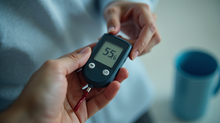Diabetes Prevention Program
- Maureen Sullivan RN CEN CDE
- Apr 19, 2016
- 2 min read

Prediabetes is a term used to describe persons who have a higher than normal blood sugar (but not high enough to confirm a diagnosis of diabetes. With respect to test results, a fasting blood sugar (glucose) level is normal if it is below 100mg/dl. Prediabetes is confirmed with fasting blood sugars between 100mg/dl and 125mg/dl; diabetes is confirmed with fasting blood sugars above 126mg/dl. Elevated (and untreated) blood sugar levels can affect overall health, increasing inflammation in the blood vessels, and raising the risk for heart disease and stroke, kidney disease and non-traumatic amputations. Persons at risk for diabetes should have be tested; knowledge is power and empowers the individual to take control of their health.
Risk factors for diabetes include having a sedentary lifestyle, being overweight, having family members with prediabetes/diabetes, having a history of hypertension (high blood pressure), smoking, and having a poor diet (fast foods, lack of fruits and vegetables, and frequent intake of sugary, carbonated drinks).
The Diabetes Prevention Program (DPP) was created years ago to address the prediabetic medical condition. The focus of education in this program is to improve your diet (lower fat intake, fresh fruits and vegetables, well balanced meals with whole grains, lower sodium, and lower cholesterol levels). There is also a focus on improving your physical activity, with a target of 150 minutes of exercise/activity a week. These combined efforts also contribute to another program goal: losing 5-7 percent of your current body weight. This relatively small amount of weight loss will lower your risk of developing diabetes.
Research connected with the Diabetes Prevention Program have shown that this program lowers the risk of developing diabetes by as much as 57 percent. The basis of the program is lifestyle changes, not medication. Simple diet and exercise have consistently shown stronger results than first line medications being prescribed for prediabetes.
For more information on the Diabetes Prevention Program, please contact the local chapter of the American Diabetes Association. The program information can also be found on the Centers for Disease Control and Prevention (http://www.cdc.gov/diabetes/basics/prediabetes.html)
As stated earlier, knowledge is power when it comes to diabetes prevention. Many people do not know what their blood sugar level is, nor are they aware they are at risk for diabetes. Elevated blood sugar levels are often asymptomatic, meaning they are not causing any medical symptoms. By getting checked for diabetes, you will put yourself in the best position to take an active role in your own good health. Know your risk factors, and lower your risk of chronic health conditions.



































Comments